Organizational Behaviour: BBC Analysis of Motivation and Team Dynamics
VerifiedAdded on 2020/10/22
|13
|4225
|468
Report
AI Summary
This report delves into the intricacies of organizational behaviour, using the BBC as a case study. It examines the influence of culture, politics, and power dynamics on employee behaviour, analyzing how these factors shape the workplace environment. The report explores content and process theories of motivation, such as Maslow's hierarchy of needs and Vroom's expectancy theory, to understand how to motivate individuals and teams to achieve desired goals. Furthermore, it discusses different types of teams, including problem-solving and virtual teams, highlighting their roles and effectiveness within an organization. The analysis encompasses the application of Hofstede's cultural dimensions, French and Raven's power types, and the practical implications of motivational strategies and team structures, providing a comprehensive overview of organizational behaviour principles in a real-world context.
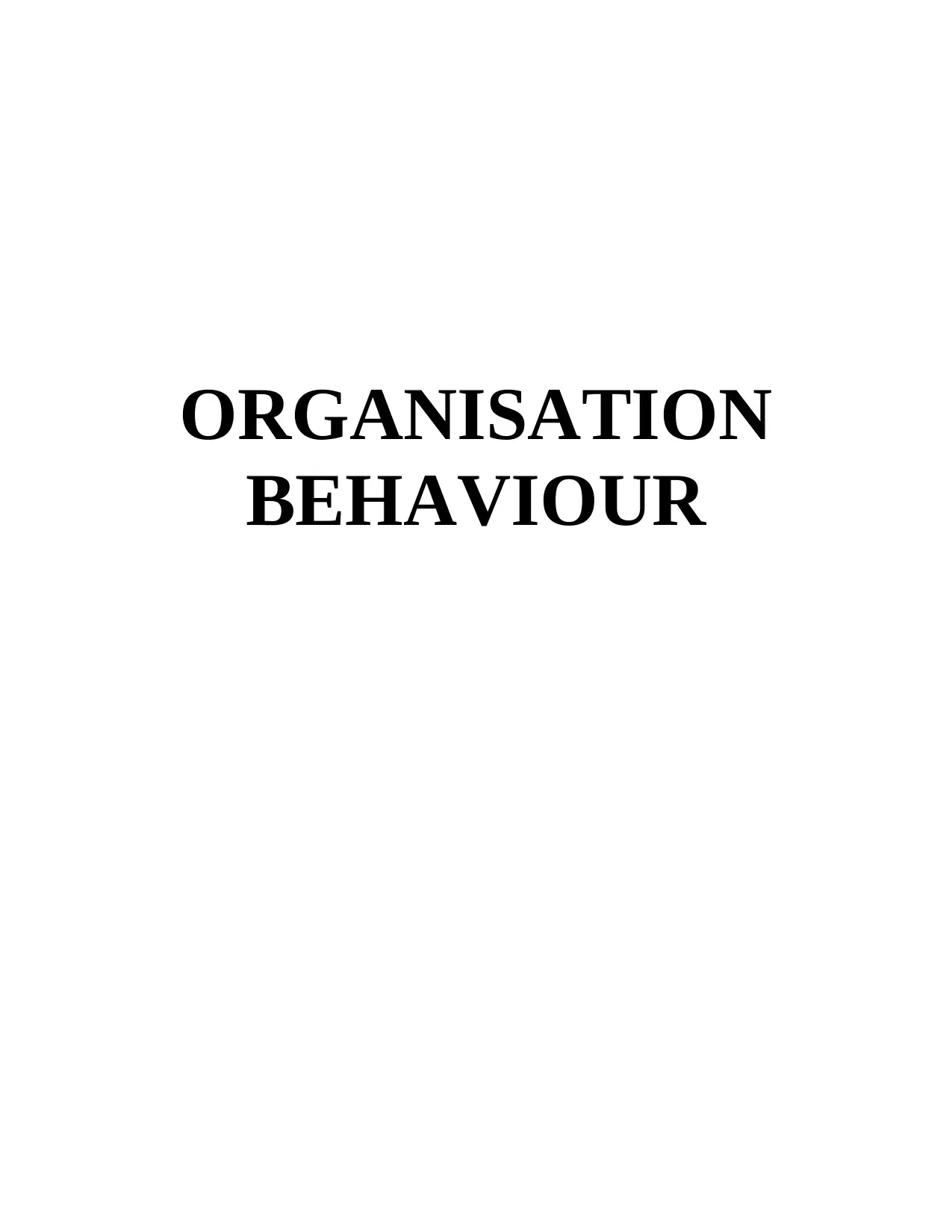
ORGANISATION
BEHAVIOUR
BEHAVIOUR
Paraphrase This Document
Need a fresh take? Get an instant paraphrase of this document with our AI Paraphraser
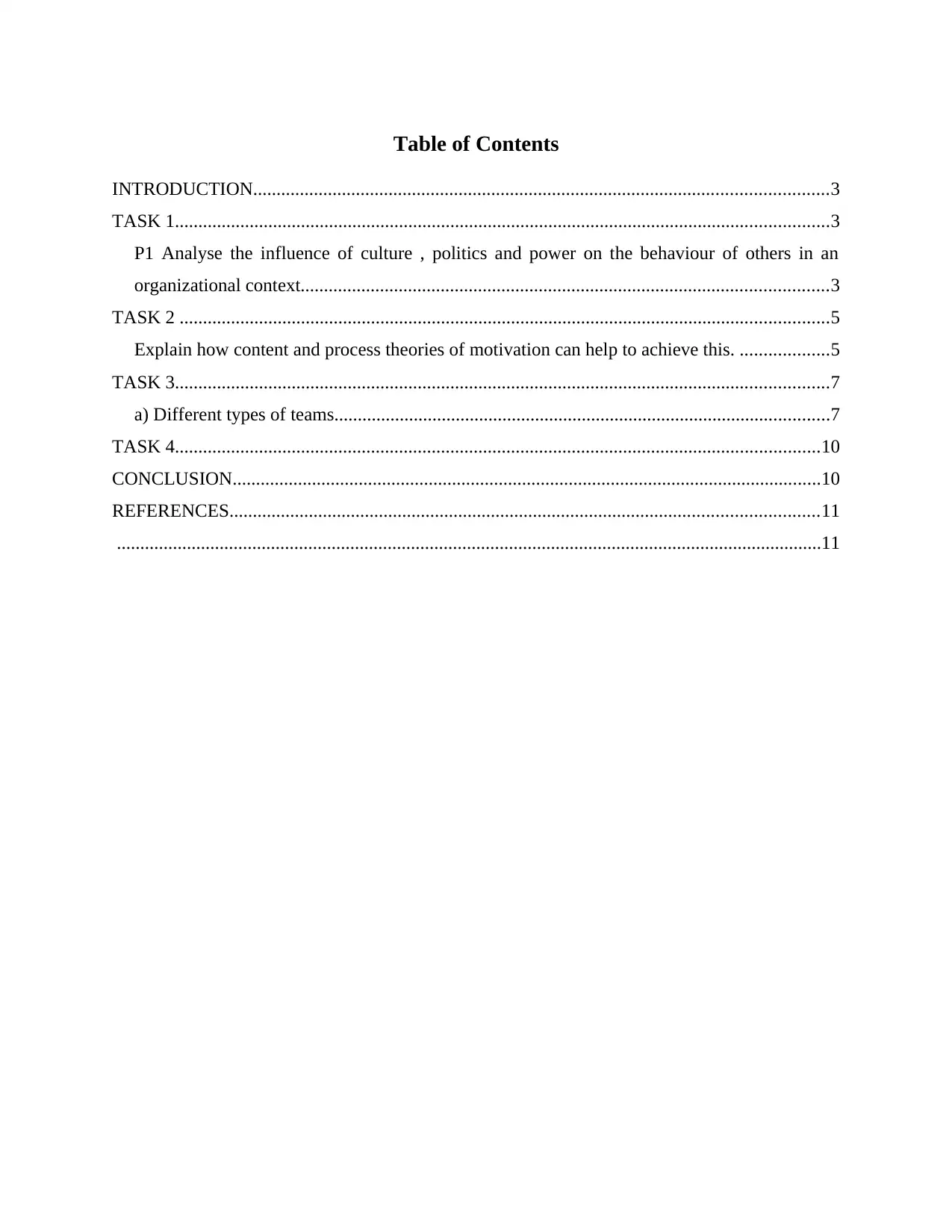
Table of Contents
INTRODUCTION...........................................................................................................................3
TASK 1............................................................................................................................................3
P1 Analyse the influence of culture , politics and power on the behaviour of others in an
organizational context.................................................................................................................3
TASK 2 ...........................................................................................................................................5
Explain how content and process theories of motivation can help to achieve this. ...................5
TASK 3............................................................................................................................................7
a) Different types of teams..........................................................................................................7
TASK 4..........................................................................................................................................10
CONCLUSION..............................................................................................................................10
REFERENCES..............................................................................................................................11
.......................................................................................................................................................11
INTRODUCTION...........................................................................................................................3
TASK 1............................................................................................................................................3
P1 Analyse the influence of culture , politics and power on the behaviour of others in an
organizational context.................................................................................................................3
TASK 2 ...........................................................................................................................................5
Explain how content and process theories of motivation can help to achieve this. ...................5
TASK 3............................................................................................................................................7
a) Different types of teams..........................................................................................................7
TASK 4..........................................................................................................................................10
CONCLUSION..............................................................................................................................10
REFERENCES..............................................................................................................................11
.......................................................................................................................................................11
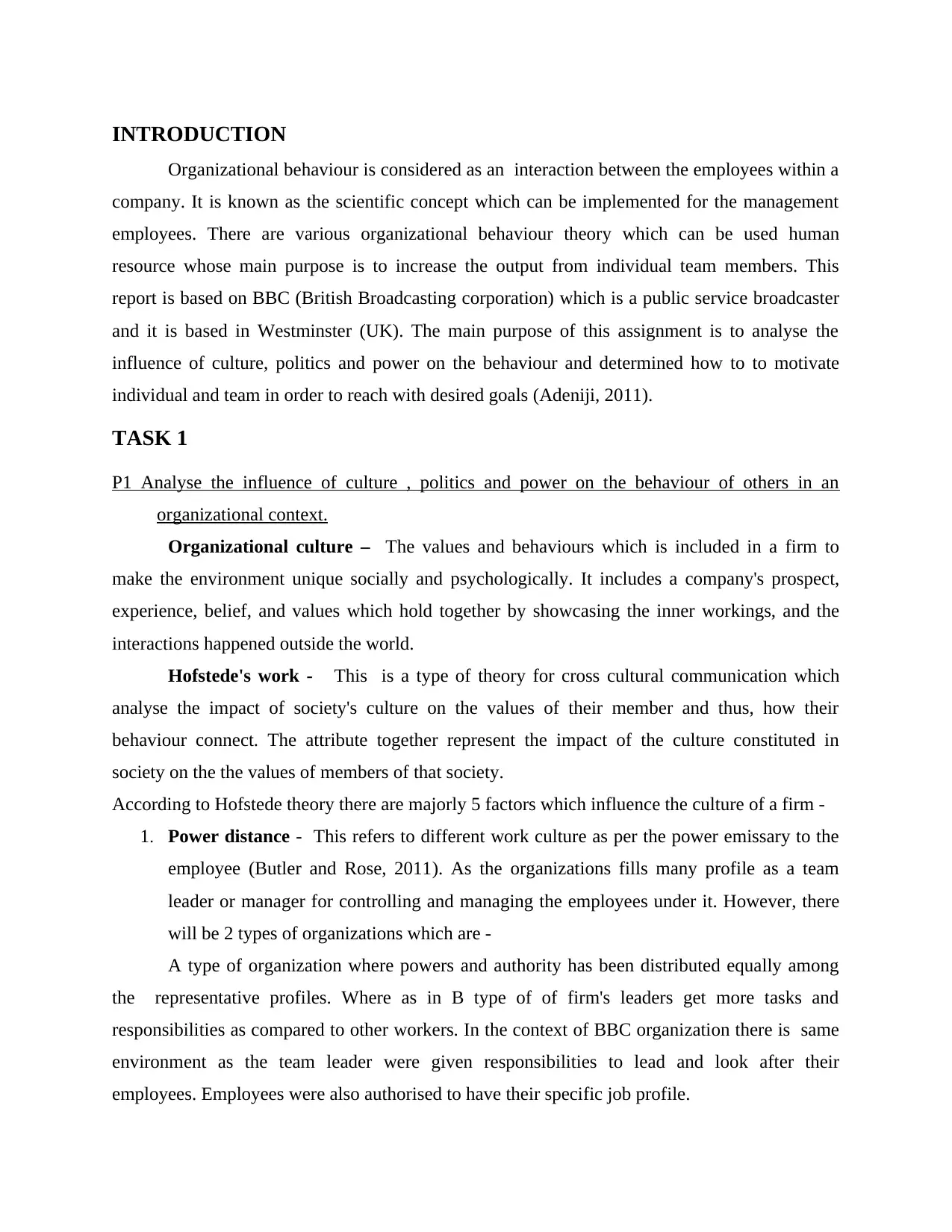
INTRODUCTION
Organizational behaviour is considered as an interaction between the employees within a
company. It is known as the scientific concept which can be implemented for the management
employees. There are various organizational behaviour theory which can be used human
resource whose main purpose is to increase the output from individual team members. This
report is based on BBC (British Broadcasting corporation) which is a public service broadcaster
and it is based in Westminster (UK). The main purpose of this assignment is to analyse the
influence of culture, politics and power on the behaviour and determined how to to motivate
individual and team in order to reach with desired goals (Adeniji, 2011).
TASK 1
P1 Analyse the influence of culture , politics and power on the behaviour of others in an
organizational context.
Organizational culture – The values and behaviours which is included in a firm to
make the environment unique socially and psychologically. It includes a company's prospect,
experience, belief, and values which hold together by showcasing the inner workings, and the
interactions happened outside the world.
Hofstede's work - This is a type of theory for cross cultural communication which
analyse the impact of society's culture on the values of their member and thus, how their
behaviour connect. The attribute together represent the impact of the culture constituted in
society on the the values of members of that society.
According to Hofstede theory there are majorly 5 factors which influence the culture of a firm -
1. Power distance - This refers to different work culture as per the power emissary to the
employee (Butler and Rose, 2011). As the organizations fills many profile as a team
leader or manager for controlling and managing the employees under it. However, there
will be 2 types of organizations which are -
A type of organization where powers and authority has been distributed equally among
the representative profiles. Where as in B type of of firm's leaders get more tasks and
responsibilities as compared to other workers. In the context of BBC organization there is same
environment as the team leader were given responsibilities to lead and look after their
employees. Employees were also authorised to have their specific job profile.
Organizational behaviour is considered as an interaction between the employees within a
company. It is known as the scientific concept which can be implemented for the management
employees. There are various organizational behaviour theory which can be used human
resource whose main purpose is to increase the output from individual team members. This
report is based on BBC (British Broadcasting corporation) which is a public service broadcaster
and it is based in Westminster (UK). The main purpose of this assignment is to analyse the
influence of culture, politics and power on the behaviour and determined how to to motivate
individual and team in order to reach with desired goals (Adeniji, 2011).
TASK 1
P1 Analyse the influence of culture , politics and power on the behaviour of others in an
organizational context.
Organizational culture – The values and behaviours which is included in a firm to
make the environment unique socially and psychologically. It includes a company's prospect,
experience, belief, and values which hold together by showcasing the inner workings, and the
interactions happened outside the world.
Hofstede's work - This is a type of theory for cross cultural communication which
analyse the impact of society's culture on the values of their member and thus, how their
behaviour connect. The attribute together represent the impact of the culture constituted in
society on the the values of members of that society.
According to Hofstede theory there are majorly 5 factors which influence the culture of a firm -
1. Power distance - This refers to different work culture as per the power emissary to the
employee (Butler and Rose, 2011). As the organizations fills many profile as a team
leader or manager for controlling and managing the employees under it. However, there
will be 2 types of organizations which are -
A type of organization where powers and authority has been distributed equally among
the representative profiles. Where as in B type of of firm's leaders get more tasks and
responsibilities as compared to other workers. In the context of BBC organization there is same
environment as the team leader were given responsibilities to lead and look after their
employees. Employees were also authorised to have their specific job profile.
⊘ This is a preview!⊘
Do you want full access?
Subscribe today to unlock all pages.

Trusted by 1+ million students worldwide
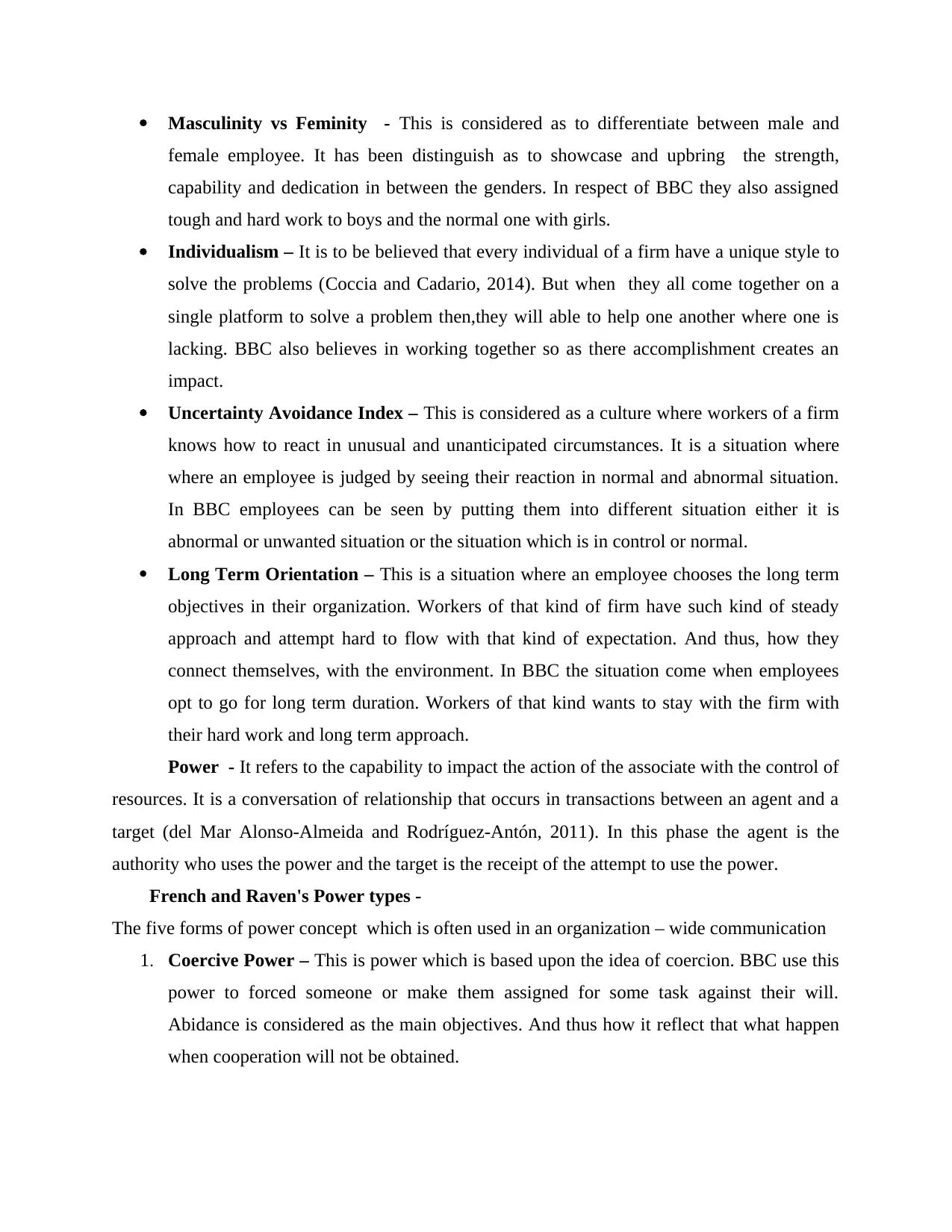
Masculinity vs Feminity - This is considered as to differentiate between male and
female employee. It has been distinguish as to showcase and upbring the strength,
capability and dedication in between the genders. In respect of BBC they also assigned
tough and hard work to boys and the normal one with girls.
Individualism – It is to be believed that every individual of a firm have a unique style to
solve the problems (Coccia and Cadario, 2014). But when they all come together on a
single platform to solve a problem then,they will able to help one another where one is
lacking. BBC also believes in working together so as there accomplishment creates an
impact.
Uncertainty Avoidance Index – This is considered as a culture where workers of a firm
knows how to react in unusual and unanticipated circumstances. It is a situation where
where an employee is judged by seeing their reaction in normal and abnormal situation.
In BBC employees can be seen by putting them into different situation either it is
abnormal or unwanted situation or the situation which is in control or normal.
Long Term Orientation – This is a situation where an employee chooses the long term
objectives in their organization. Workers of that kind of firm have such kind of steady
approach and attempt hard to flow with that kind of expectation. And thus, how they
connect themselves, with the environment. In BBC the situation come when employees
opt to go for long term duration. Workers of that kind wants to stay with the firm with
their hard work and long term approach.
Power - It refers to the capability to impact the action of the associate with the control of
resources. It is a conversation of relationship that occurs in transactions between an agent and a
target (del Mar Alonso-Almeida and Rodríguez-Antón, 2011). In this phase the agent is the
authority who uses the power and the target is the receipt of the attempt to use the power.
French and Raven's Power types -
The five forms of power concept which is often used in an organization – wide communication
1. Coercive Power – This is power which is based upon the idea of coercion. BBC use this
power to forced someone or make them assigned for some task against their will.
Abidance is considered as the main objectives. And thus how it reflect that what happen
when cooperation will not be obtained.
female employee. It has been distinguish as to showcase and upbring the strength,
capability and dedication in between the genders. In respect of BBC they also assigned
tough and hard work to boys and the normal one with girls.
Individualism – It is to be believed that every individual of a firm have a unique style to
solve the problems (Coccia and Cadario, 2014). But when they all come together on a
single platform to solve a problem then,they will able to help one another where one is
lacking. BBC also believes in working together so as there accomplishment creates an
impact.
Uncertainty Avoidance Index – This is considered as a culture where workers of a firm
knows how to react in unusual and unanticipated circumstances. It is a situation where
where an employee is judged by seeing their reaction in normal and abnormal situation.
In BBC employees can be seen by putting them into different situation either it is
abnormal or unwanted situation or the situation which is in control or normal.
Long Term Orientation – This is a situation where an employee chooses the long term
objectives in their organization. Workers of that kind of firm have such kind of steady
approach and attempt hard to flow with that kind of expectation. And thus, how they
connect themselves, with the environment. In BBC the situation come when employees
opt to go for long term duration. Workers of that kind wants to stay with the firm with
their hard work and long term approach.
Power - It refers to the capability to impact the action of the associate with the control of
resources. It is a conversation of relationship that occurs in transactions between an agent and a
target (del Mar Alonso-Almeida and Rodríguez-Antón, 2011). In this phase the agent is the
authority who uses the power and the target is the receipt of the attempt to use the power.
French and Raven's Power types -
The five forms of power concept which is often used in an organization – wide communication
1. Coercive Power – This is power which is based upon the idea of coercion. BBC use this
power to forced someone or make them assigned for some task against their will.
Abidance is considered as the main objectives. And thus how it reflect that what happen
when cooperation will not be obtained.
Paraphrase This Document
Need a fresh take? Get an instant paraphrase of this document with our AI Paraphraser
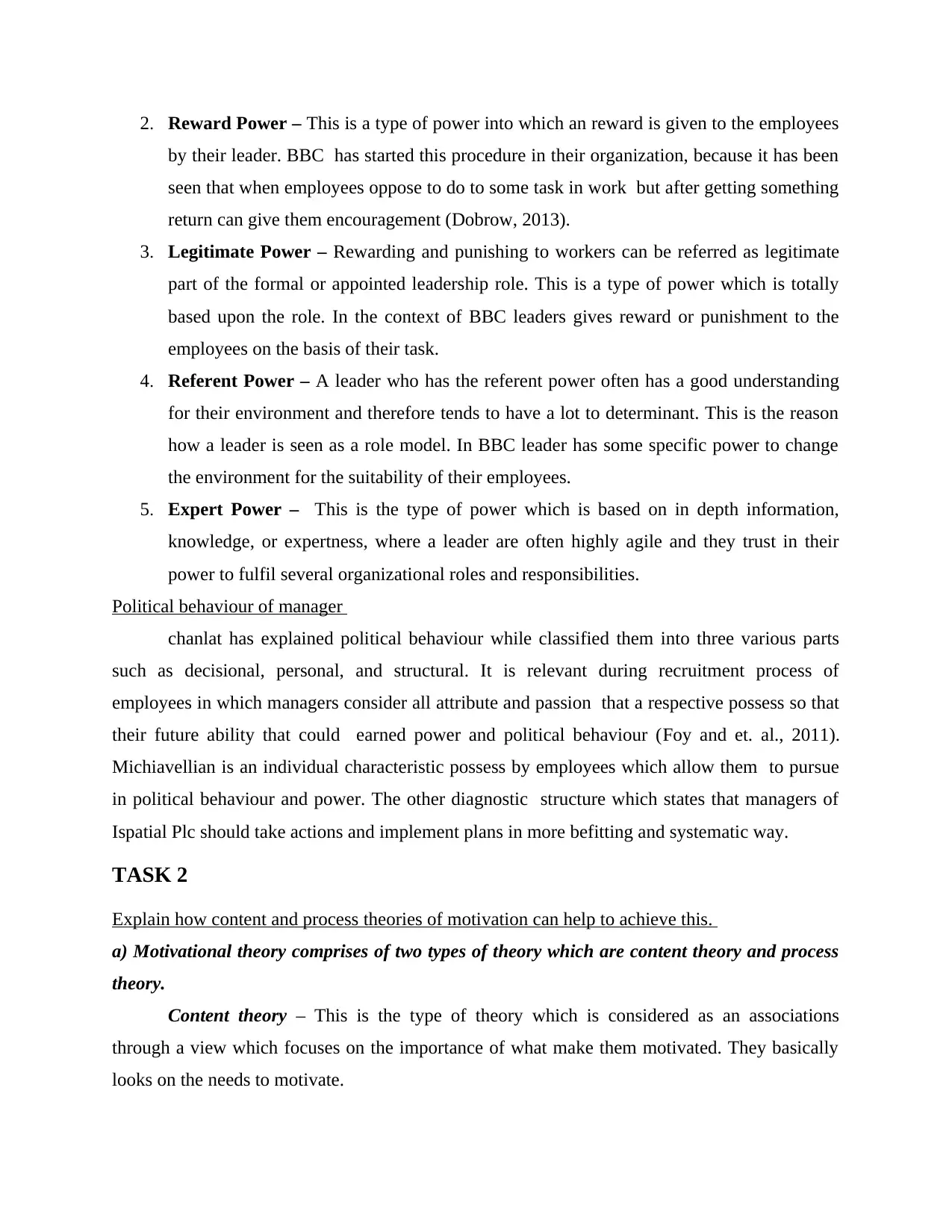
2. Reward Power – This is a type of power into which an reward is given to the employees
by their leader. BBC has started this procedure in their organization, because it has been
seen that when employees oppose to do to some task in work but after getting something
return can give them encouragement (Dobrow, 2013).
3. Legitimate Power – Rewarding and punishing to workers can be referred as legitimate
part of the formal or appointed leadership role. This is a type of power which is totally
based upon the role. In the context of BBC leaders gives reward or punishment to the
employees on the basis of their task.
4. Referent Power – A leader who has the referent power often has a good understanding
for their environment and therefore tends to have a lot to determinant. This is the reason
how a leader is seen as a role model. In BBC leader has some specific power to change
the environment for the suitability of their employees.
5. Expert Power – This is the type of power which is based on in depth information,
knowledge, or expertness, where a leader are often highly agile and they trust in their
power to fulfil several organizational roles and responsibilities.
Political behaviour of manager
chanlat has explained political behaviour while classified them into three various parts
such as decisional, personal, and structural. It is relevant during recruitment process of
employees in which managers consider all attribute and passion that a respective possess so that
their future ability that could earned power and political behaviour (Foy and et. al., 2011).
Michiavellian is an individual characteristic possess by employees which allow them to pursue
in political behaviour and power. The other diagnostic structure which states that managers of
Ispatial Plc should take actions and implement plans in more befitting and systematic way.
TASK 2
Explain how content and process theories of motivation can help to achieve this.
a) Motivational theory comprises of two types of theory which are content theory and process
theory.
Content theory – This is the type of theory which is considered as an associations
through a view which focuses on the importance of what make them motivated. They basically
looks on the needs to motivate.
by their leader. BBC has started this procedure in their organization, because it has been
seen that when employees oppose to do to some task in work but after getting something
return can give them encouragement (Dobrow, 2013).
3. Legitimate Power – Rewarding and punishing to workers can be referred as legitimate
part of the formal or appointed leadership role. This is a type of power which is totally
based upon the role. In the context of BBC leaders gives reward or punishment to the
employees on the basis of their task.
4. Referent Power – A leader who has the referent power often has a good understanding
for their environment and therefore tends to have a lot to determinant. This is the reason
how a leader is seen as a role model. In BBC leader has some specific power to change
the environment for the suitability of their employees.
5. Expert Power – This is the type of power which is based on in depth information,
knowledge, or expertness, where a leader are often highly agile and they trust in their
power to fulfil several organizational roles and responsibilities.
Political behaviour of manager
chanlat has explained political behaviour while classified them into three various parts
such as decisional, personal, and structural. It is relevant during recruitment process of
employees in which managers consider all attribute and passion that a respective possess so that
their future ability that could earned power and political behaviour (Foy and et. al., 2011).
Michiavellian is an individual characteristic possess by employees which allow them to pursue
in political behaviour and power. The other diagnostic structure which states that managers of
Ispatial Plc should take actions and implement plans in more befitting and systematic way.
TASK 2
Explain how content and process theories of motivation can help to achieve this.
a) Motivational theory comprises of two types of theory which are content theory and process
theory.
Content theory – This is the type of theory which is considered as an associations
through a view which focuses on the importance of what make them motivated. They basically
looks on the needs to motivate.
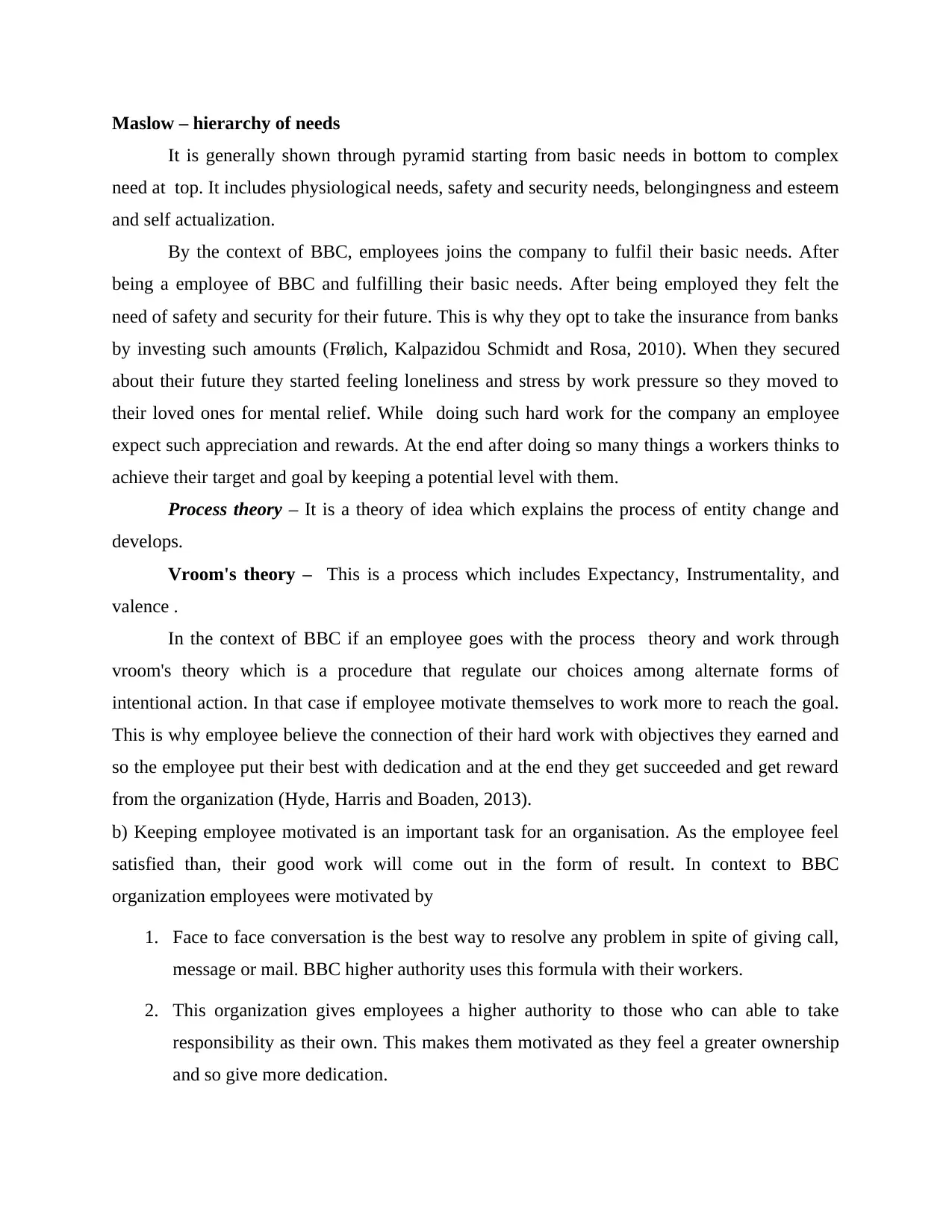
Maslow – hierarchy of needs
It is generally shown through pyramid starting from basic needs in bottom to complex
need at top. It includes physiological needs, safety and security needs, belongingness and esteem
and self actualization.
By the context of BBC, employees joins the company to fulfil their basic needs. After
being a employee of BBC and fulfilling their basic needs. After being employed they felt the
need of safety and security for their future. This is why they opt to take the insurance from banks
by investing such amounts (Frølich, Kalpazidou Schmidt and Rosa, 2010). When they secured
about their future they started feeling loneliness and stress by work pressure so they moved to
their loved ones for mental relief. While doing such hard work for the company an employee
expect such appreciation and rewards. At the end after doing so many things a workers thinks to
achieve their target and goal by keeping a potential level with them.
Process theory – It is a theory of idea which explains the process of entity change and
develops.
Vroom's theory – This is a process which includes Expectancy, Instrumentality, and
valence .
In the context of BBC if an employee goes with the process theory and work through
vroom's theory which is a procedure that regulate our choices among alternate forms of
intentional action. In that case if employee motivate themselves to work more to reach the goal.
This is why employee believe the connection of their hard work with objectives they earned and
so the employee put their best with dedication and at the end they get succeeded and get reward
from the organization (Hyde, Harris and Boaden, 2013).
b) Keeping employee motivated is an important task for an organisation. As the employee feel
satisfied than, their good work will come out in the form of result. In context to BBC
organization employees were motivated by
1. Face to face conversation is the best way to resolve any problem in spite of giving call,
message or mail. BBC higher authority uses this formula with their workers.
2. This organization gives employees a higher authority to those who can able to take
responsibility as their own. This makes them motivated as they feel a greater ownership
and so give more dedication.
It is generally shown through pyramid starting from basic needs in bottom to complex
need at top. It includes physiological needs, safety and security needs, belongingness and esteem
and self actualization.
By the context of BBC, employees joins the company to fulfil their basic needs. After
being a employee of BBC and fulfilling their basic needs. After being employed they felt the
need of safety and security for their future. This is why they opt to take the insurance from banks
by investing such amounts (Frølich, Kalpazidou Schmidt and Rosa, 2010). When they secured
about their future they started feeling loneliness and stress by work pressure so they moved to
their loved ones for mental relief. While doing such hard work for the company an employee
expect such appreciation and rewards. At the end after doing so many things a workers thinks to
achieve their target and goal by keeping a potential level with them.
Process theory – It is a theory of idea which explains the process of entity change and
develops.
Vroom's theory – This is a process which includes Expectancy, Instrumentality, and
valence .
In the context of BBC if an employee goes with the process theory and work through
vroom's theory which is a procedure that regulate our choices among alternate forms of
intentional action. In that case if employee motivate themselves to work more to reach the goal.
This is why employee believe the connection of their hard work with objectives they earned and
so the employee put their best with dedication and at the end they get succeeded and get reward
from the organization (Hyde, Harris and Boaden, 2013).
b) Keeping employee motivated is an important task for an organisation. As the employee feel
satisfied than, their good work will come out in the form of result. In context to BBC
organization employees were motivated by
1. Face to face conversation is the best way to resolve any problem in spite of giving call,
message or mail. BBC higher authority uses this formula with their workers.
2. This organization gives employees a higher authority to those who can able to take
responsibility as their own. This makes them motivated as they feel a greater ownership
and so give more dedication.
⊘ This is a preview!⊘
Do you want full access?
Subscribe today to unlock all pages.

Trusted by 1+ million students worldwide
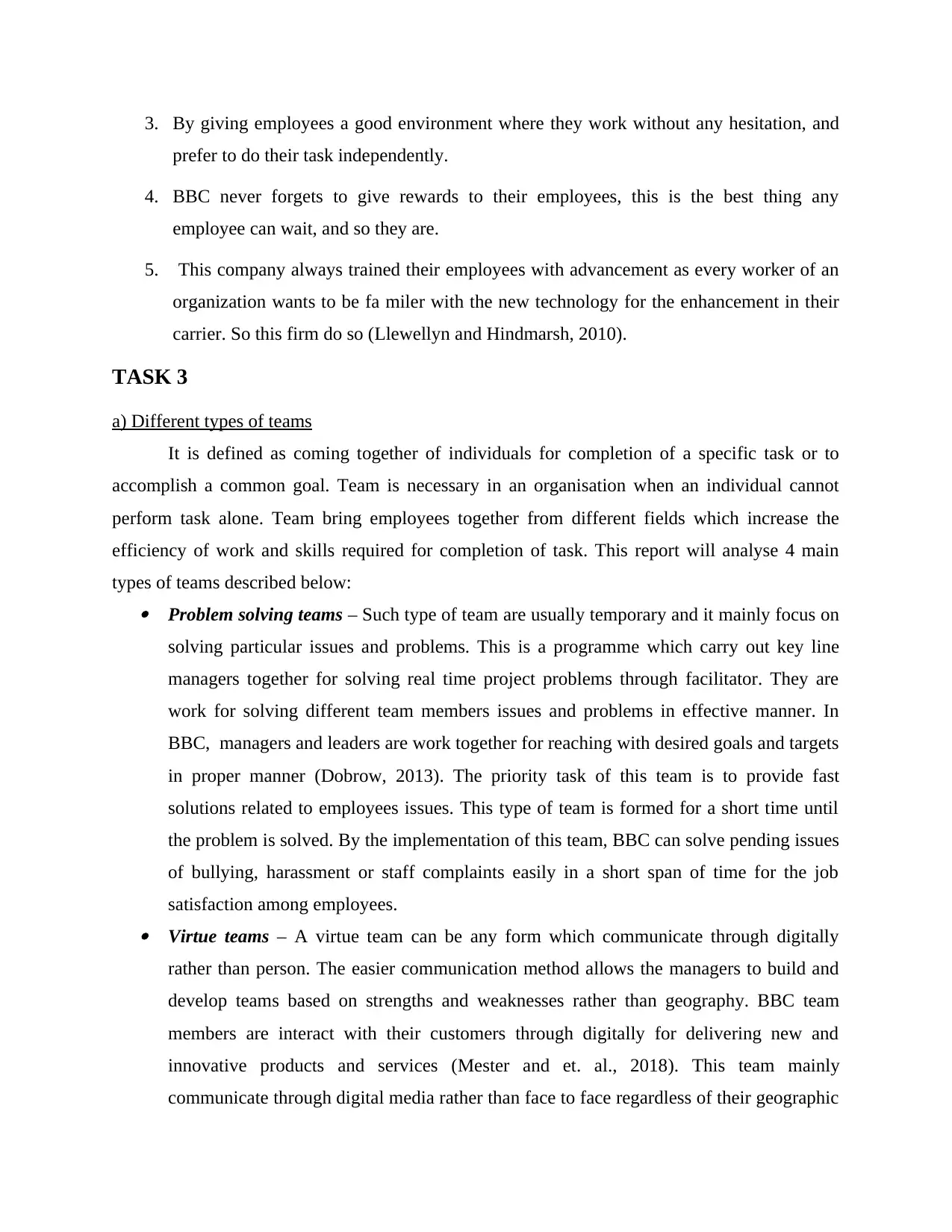
3. By giving employees a good environment where they work without any hesitation, and
prefer to do their task independently.
4. BBC never forgets to give rewards to their employees, this is the best thing any
employee can wait, and so they are.
5. This company always trained their employees with advancement as every worker of an
organization wants to be fa miler with the new technology for the enhancement in their
carrier. So this firm do so (Llewellyn and Hindmarsh, 2010).
TASK 3
a) Different types of teams
It is defined as coming together of individuals for completion of a specific task or to
accomplish a common goal. Team is necessary in an organisation when an individual cannot
perform task alone. Team bring employees together from different fields which increase the
efficiency of work and skills required for completion of task. This report will analyse 4 main
types of teams described below: Problem solving teams – Such type of team are usually temporary and it mainly focus on
solving particular issues and problems. This is a programme which carry out key line
managers together for solving real time project problems through facilitator. They are
work for solving different team members issues and problems in effective manner. In
BBC, managers and leaders are work together for reaching with desired goals and targets
in proper manner (Dobrow, 2013). The priority task of this team is to provide fast
solutions related to employees issues. This type of team is formed for a short time until
the problem is solved. By the implementation of this team, BBC can solve pending issues
of bullying, harassment or staff complaints easily in a short span of time for the job
satisfaction among employees. Virtue teams – A virtue team can be any form which communicate through digitally
rather than person. The easier communication method allows the managers to build and
develop teams based on strengths and weaknesses rather than geography. BBC team
members are interact with their customers through digitally for delivering new and
innovative products and services (Mester and et. al., 2018). This team mainly
communicate through digital media rather than face to face regardless of their geographic
prefer to do their task independently.
4. BBC never forgets to give rewards to their employees, this is the best thing any
employee can wait, and so they are.
5. This company always trained their employees with advancement as every worker of an
organization wants to be fa miler with the new technology for the enhancement in their
carrier. So this firm do so (Llewellyn and Hindmarsh, 2010).
TASK 3
a) Different types of teams
It is defined as coming together of individuals for completion of a specific task or to
accomplish a common goal. Team is necessary in an organisation when an individual cannot
perform task alone. Team bring employees together from different fields which increase the
efficiency of work and skills required for completion of task. This report will analyse 4 main
types of teams described below: Problem solving teams – Such type of team are usually temporary and it mainly focus on
solving particular issues and problems. This is a programme which carry out key line
managers together for solving real time project problems through facilitator. They are
work for solving different team members issues and problems in effective manner. In
BBC, managers and leaders are work together for reaching with desired goals and targets
in proper manner (Dobrow, 2013). The priority task of this team is to provide fast
solutions related to employees issues. This type of team is formed for a short time until
the problem is solved. By the implementation of this team, BBC can solve pending issues
of bullying, harassment or staff complaints easily in a short span of time for the job
satisfaction among employees. Virtue teams – A virtue team can be any form which communicate through digitally
rather than person. The easier communication method allows the managers to build and
develop teams based on strengths and weaknesses rather than geography. BBC team
members are interact with their customers through digitally for delivering new and
innovative products and services (Mester and et. al., 2018). This team mainly
communicate through digital media rather than face to face regardless of their geographic
Paraphrase This Document
Need a fresh take? Get an instant paraphrase of this document with our AI Paraphraser
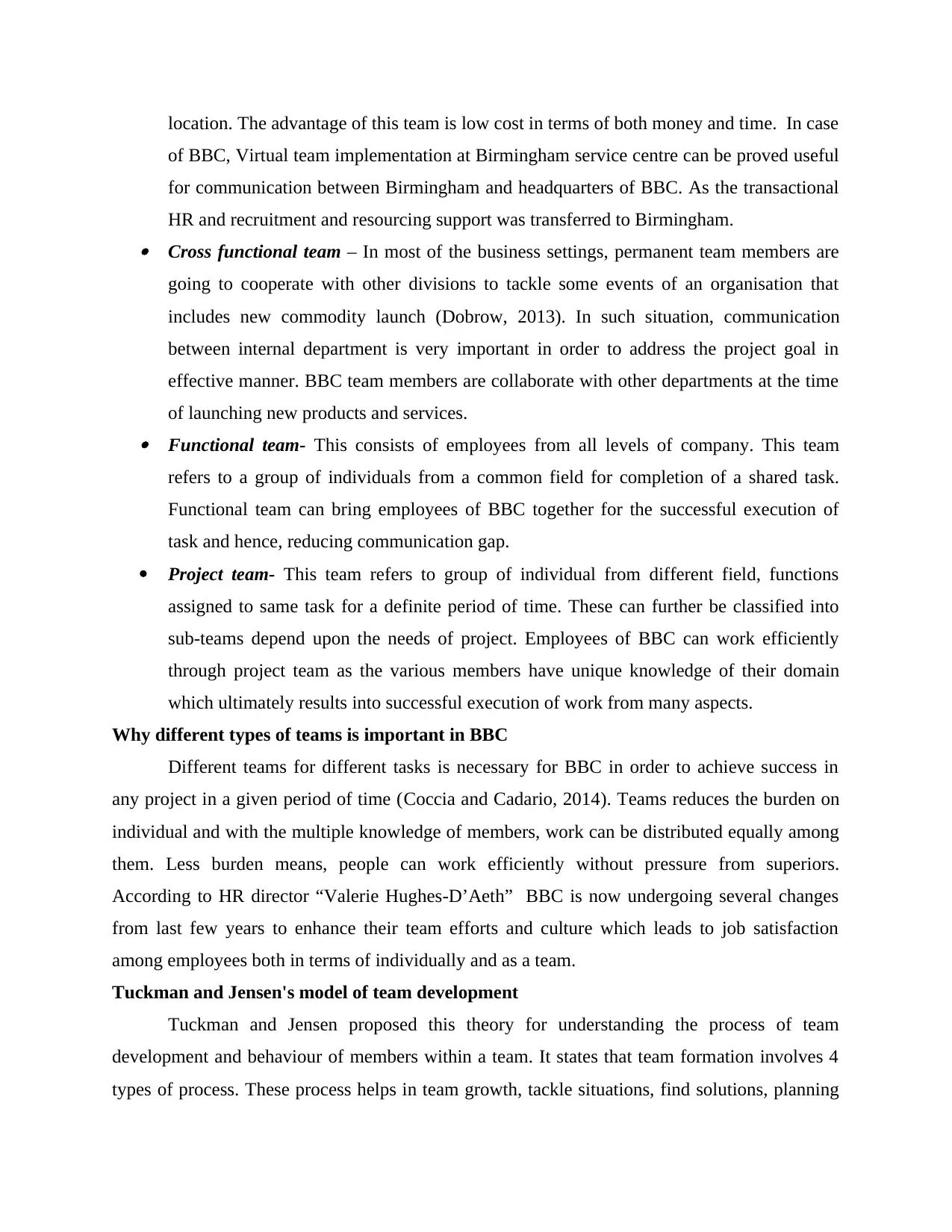
location. The advantage of this team is low cost in terms of both money and time. In case
of BBC, Virtual team implementation at Birmingham service centre can be proved useful
for communication between Birmingham and headquarters of BBC. As the transactional
HR and recruitment and resourcing support was transferred to Birmingham. Cross functional team – In most of the business settings, permanent team members are
going to cooperate with other divisions to tackle some events of an organisation that
includes new commodity launch (Dobrow, 2013). In such situation, communication
between internal department is very important in order to address the project goal in
effective manner. BBC team members are collaborate with other departments at the time
of launching new products and services. Functional team- This consists of employees from all levels of company. This team
refers to a group of individuals from a common field for completion of a shared task.
Functional team can bring employees of BBC together for the successful execution of
task and hence, reducing communication gap.
Project team- This team refers to group of individual from different field, functions
assigned to same task for a definite period of time. These can further be classified into
sub-teams depend upon the needs of project. Employees of BBC can work efficiently
through project team as the various members have unique knowledge of their domain
which ultimately results into successful execution of work from many aspects.
Why different types of teams is important in BBC
Different teams for different tasks is necessary for BBC in order to achieve success in
any project in a given period of time (Coccia and Cadario, 2014). Teams reduces the burden on
individual and with the multiple knowledge of members, work can be distributed equally among
them. Less burden means, people can work efficiently without pressure from superiors.
According to HR director “Valerie Hughes-D’Aeth” BBC is now undergoing several changes
from last few years to enhance their team efforts and culture which leads to job satisfaction
among employees both in terms of individually and as a team.
Tuckman and Jensen's model of team development
Tuckman and Jensen proposed this theory for understanding the process of team
development and behaviour of members within a team. It states that team formation involves 4
types of process. These process helps in team growth, tackle situations, find solutions, planning
of BBC, Virtual team implementation at Birmingham service centre can be proved useful
for communication between Birmingham and headquarters of BBC. As the transactional
HR and recruitment and resourcing support was transferred to Birmingham. Cross functional team – In most of the business settings, permanent team members are
going to cooperate with other divisions to tackle some events of an organisation that
includes new commodity launch (Dobrow, 2013). In such situation, communication
between internal department is very important in order to address the project goal in
effective manner. BBC team members are collaborate with other departments at the time
of launching new products and services. Functional team- This consists of employees from all levels of company. This team
refers to a group of individuals from a common field for completion of a shared task.
Functional team can bring employees of BBC together for the successful execution of
task and hence, reducing communication gap.
Project team- This team refers to group of individual from different field, functions
assigned to same task for a definite period of time. These can further be classified into
sub-teams depend upon the needs of project. Employees of BBC can work efficiently
through project team as the various members have unique knowledge of their domain
which ultimately results into successful execution of work from many aspects.
Why different types of teams is important in BBC
Different teams for different tasks is necessary for BBC in order to achieve success in
any project in a given period of time (Coccia and Cadario, 2014). Teams reduces the burden on
individual and with the multiple knowledge of members, work can be distributed equally among
them. Less burden means, people can work efficiently without pressure from superiors.
According to HR director “Valerie Hughes-D’Aeth” BBC is now undergoing several changes
from last few years to enhance their team efforts and culture which leads to job satisfaction
among employees both in terms of individually and as a team.
Tuckman and Jensen's model of team development
Tuckman and Jensen proposed this theory for understanding the process of team
development and behaviour of members within a team. It states that team formation involves 4
types of process. These process helps in team growth, tackle situations, find solutions, planning
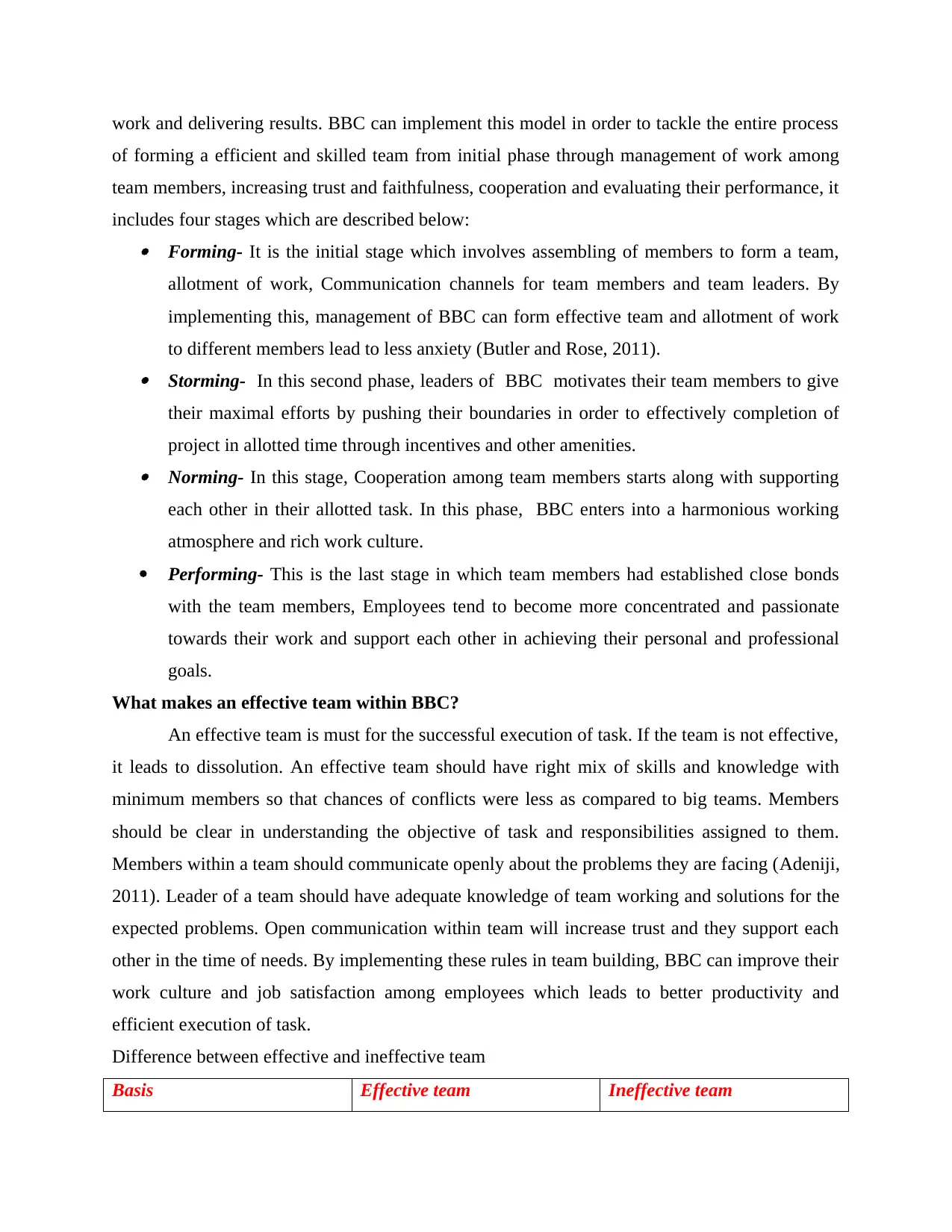
work and delivering results. BBC can implement this model in order to tackle the entire process
of forming a efficient and skilled team from initial phase through management of work among
team members, increasing trust and faithfulness, cooperation and evaluating their performance, it
includes four stages which are described below: Forming- It is the initial stage which involves assembling of members to form a team,
allotment of work, Communication channels for team members and team leaders. By
implementing this, management of BBC can form effective team and allotment of work
to different members lead to less anxiety (Butler and Rose, 2011). Storming- In this second phase, leaders of BBC motivates their team members to give
their maximal efforts by pushing their boundaries in order to effectively completion of
project in allotted time through incentives and other amenities. Norming- In this stage, Cooperation among team members starts along with supporting
each other in their allotted task. In this phase, BBC enters into a harmonious working
atmosphere and rich work culture.
Performing- This is the last stage in which team members had established close bonds
with the team members, Employees tend to become more concentrated and passionate
towards their work and support each other in achieving their personal and professional
goals.
What makes an effective team within BBC?
An effective team is must for the successful execution of task. If the team is not effective,
it leads to dissolution. An effective team should have right mix of skills and knowledge with
minimum members so that chances of conflicts were less as compared to big teams. Members
should be clear in understanding the objective of task and responsibilities assigned to them.
Members within a team should communicate openly about the problems they are facing (Adeniji,
2011). Leader of a team should have adequate knowledge of team working and solutions for the
expected problems. Open communication within team will increase trust and they support each
other in the time of needs. By implementing these rules in team building, BBC can improve their
work culture and job satisfaction among employees which leads to better productivity and
efficient execution of task.
Difference between effective and ineffective team
Basis Effective team Ineffective team
of forming a efficient and skilled team from initial phase through management of work among
team members, increasing trust and faithfulness, cooperation and evaluating their performance, it
includes four stages which are described below: Forming- It is the initial stage which involves assembling of members to form a team,
allotment of work, Communication channels for team members and team leaders. By
implementing this, management of BBC can form effective team and allotment of work
to different members lead to less anxiety (Butler and Rose, 2011). Storming- In this second phase, leaders of BBC motivates their team members to give
their maximal efforts by pushing their boundaries in order to effectively completion of
project in allotted time through incentives and other amenities. Norming- In this stage, Cooperation among team members starts along with supporting
each other in their allotted task. In this phase, BBC enters into a harmonious working
atmosphere and rich work culture.
Performing- This is the last stage in which team members had established close bonds
with the team members, Employees tend to become more concentrated and passionate
towards their work and support each other in achieving their personal and professional
goals.
What makes an effective team within BBC?
An effective team is must for the successful execution of task. If the team is not effective,
it leads to dissolution. An effective team should have right mix of skills and knowledge with
minimum members so that chances of conflicts were less as compared to big teams. Members
should be clear in understanding the objective of task and responsibilities assigned to them.
Members within a team should communicate openly about the problems they are facing (Adeniji,
2011). Leader of a team should have adequate knowledge of team working and solutions for the
expected problems. Open communication within team will increase trust and they support each
other in the time of needs. By implementing these rules in team building, BBC can improve their
work culture and job satisfaction among employees which leads to better productivity and
efficient execution of task.
Difference between effective and ineffective team
Basis Effective team Ineffective team
⊘ This is a preview!⊘
Do you want full access?
Subscribe today to unlock all pages.

Trusted by 1+ million students worldwide
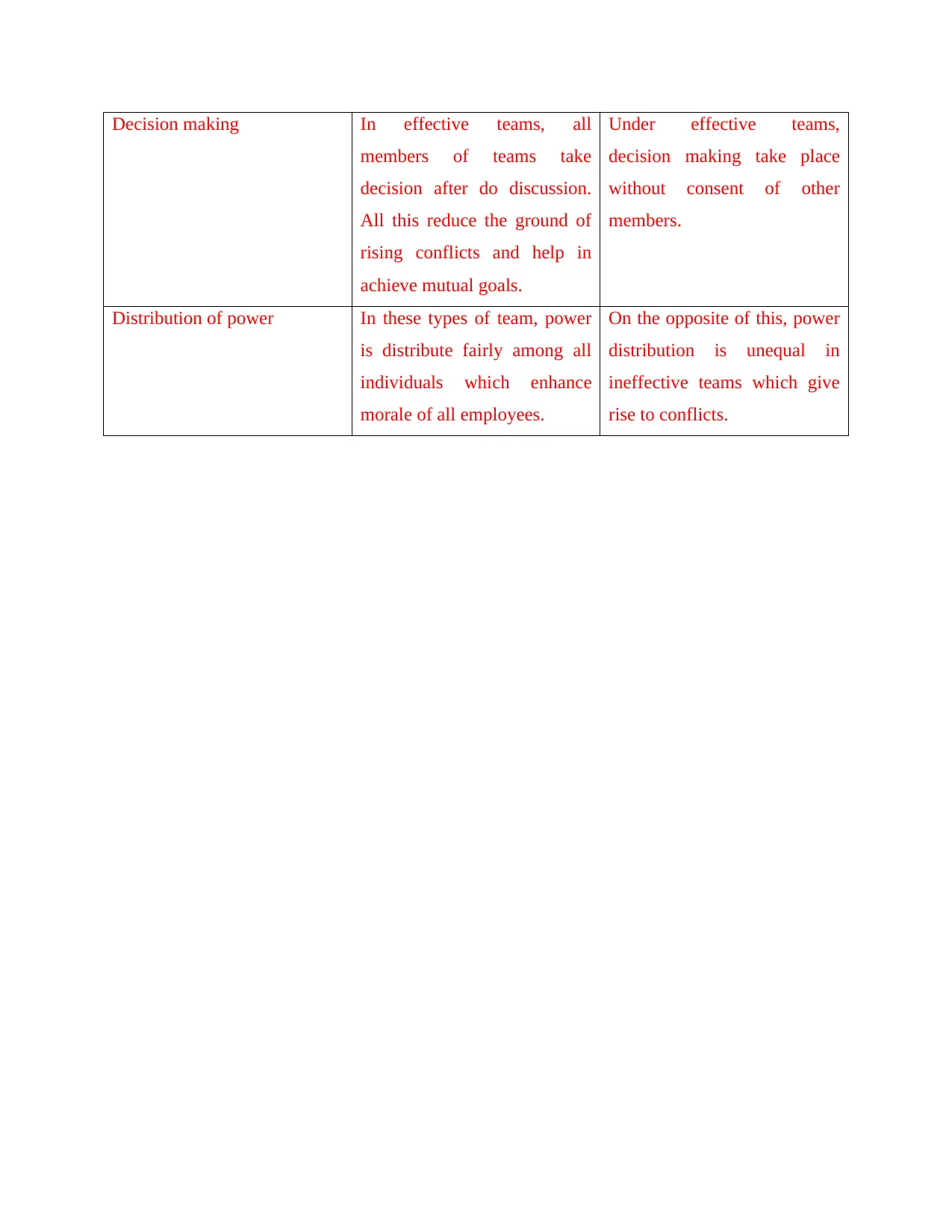
Decision making In effective teams, all
members of teams take
decision after do discussion.
All this reduce the ground of
rising conflicts and help in
achieve mutual goals.
Under effective teams,
decision making take place
without consent of other
members.
Distribution of power In these types of team, power
is distribute fairly among all
individuals which enhance
morale of all employees.
On the opposite of this, power
distribution is unequal in
ineffective teams which give
rise to conflicts.
members of teams take
decision after do discussion.
All this reduce the ground of
rising conflicts and help in
achieve mutual goals.
Under effective teams,
decision making take place
without consent of other
members.
Distribution of power In these types of team, power
is distribute fairly among all
individuals which enhance
morale of all employees.
On the opposite of this, power
distribution is unequal in
ineffective teams which give
rise to conflicts.
Paraphrase This Document
Need a fresh take? Get an instant paraphrase of this document with our AI Paraphraser
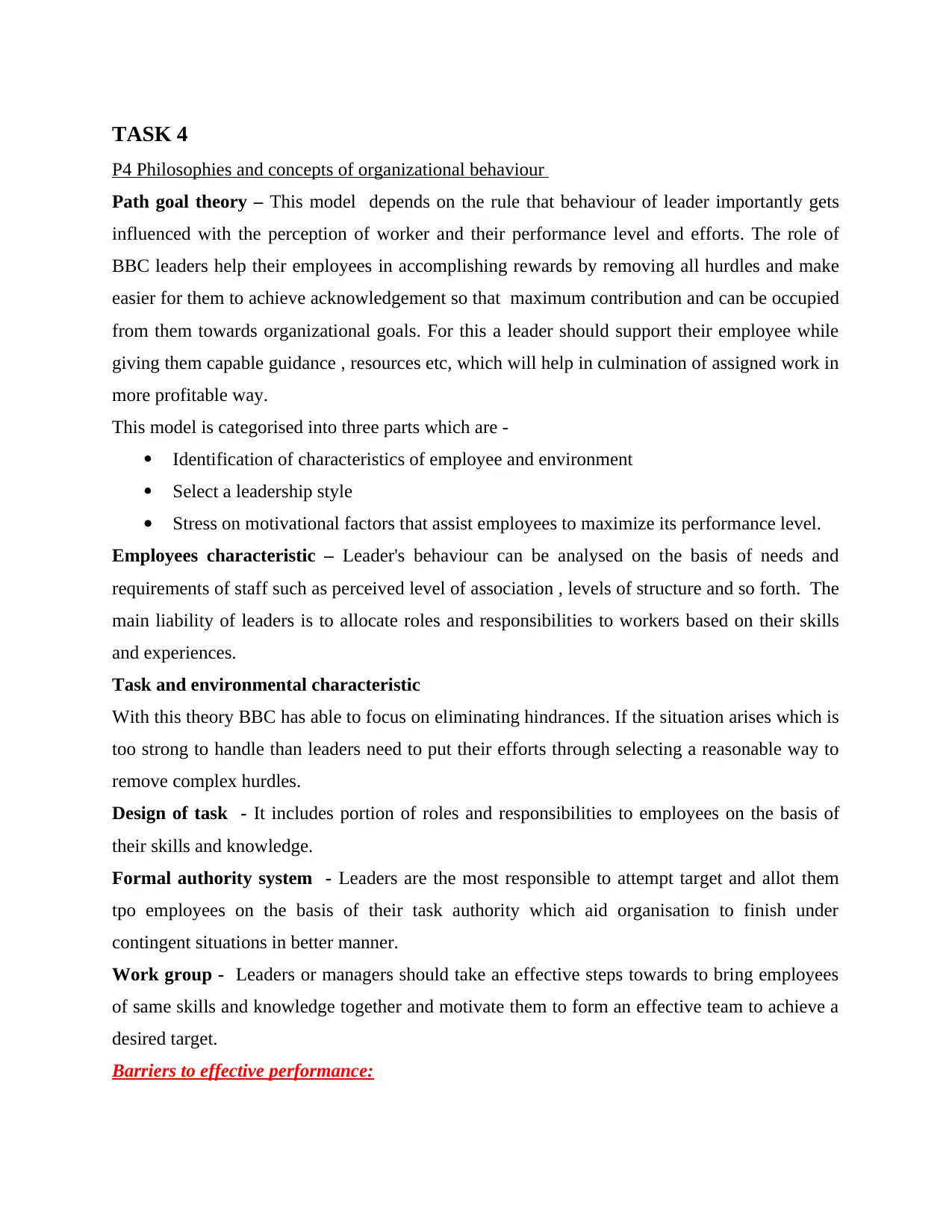
TASK 4
P4 Philosophies and concepts of organizational behaviour
Path goal theory – This model depends on the rule that behaviour of leader importantly gets
influenced with the perception of worker and their performance level and efforts. The role of
BBC leaders help their employees in accomplishing rewards by removing all hurdles and make
easier for them to achieve acknowledgement so that maximum contribution and can be occupied
from them towards organizational goals. For this a leader should support their employee while
giving them capable guidance , resources etc, which will help in culmination of assigned work in
more profitable way.
This model is categorised into three parts which are -
Identification of characteristics of employee and environment
Select a leadership style
Stress on motivational factors that assist employees to maximize its performance level.
Employees characteristic – Leader's behaviour can be analysed on the basis of needs and
requirements of staff such as perceived level of association , levels of structure and so forth. The
main liability of leaders is to allocate roles and responsibilities to workers based on their skills
and experiences.
Task and environmental characteristic
With this theory BBC has able to focus on eliminating hindrances. If the situation arises which is
too strong to handle than leaders need to put their efforts through selecting a reasonable way to
remove complex hurdles.
Design of task - It includes portion of roles and responsibilities to employees on the basis of
their skills and knowledge.
Formal authority system - Leaders are the most responsible to attempt target and allot them
tpo employees on the basis of their task authority which aid organisation to finish under
contingent situations in better manner.
Work group - Leaders or managers should take an effective steps towards to bring employees
of same skills and knowledge together and motivate them to form an effective team to achieve a
desired target.
Barriers to effective performance:
P4 Philosophies and concepts of organizational behaviour
Path goal theory – This model depends on the rule that behaviour of leader importantly gets
influenced with the perception of worker and their performance level and efforts. The role of
BBC leaders help their employees in accomplishing rewards by removing all hurdles and make
easier for them to achieve acknowledgement so that maximum contribution and can be occupied
from them towards organizational goals. For this a leader should support their employee while
giving them capable guidance , resources etc, which will help in culmination of assigned work in
more profitable way.
This model is categorised into three parts which are -
Identification of characteristics of employee and environment
Select a leadership style
Stress on motivational factors that assist employees to maximize its performance level.
Employees characteristic – Leader's behaviour can be analysed on the basis of needs and
requirements of staff such as perceived level of association , levels of structure and so forth. The
main liability of leaders is to allocate roles and responsibilities to workers based on their skills
and experiences.
Task and environmental characteristic
With this theory BBC has able to focus on eliminating hindrances. If the situation arises which is
too strong to handle than leaders need to put their efforts through selecting a reasonable way to
remove complex hurdles.
Design of task - It includes portion of roles and responsibilities to employees on the basis of
their skills and knowledge.
Formal authority system - Leaders are the most responsible to attempt target and allot them
tpo employees on the basis of their task authority which aid organisation to finish under
contingent situations in better manner.
Work group - Leaders or managers should take an effective steps towards to bring employees
of same skills and knowledge together and motivate them to form an effective team to achieve a
desired target.
Barriers to effective performance:
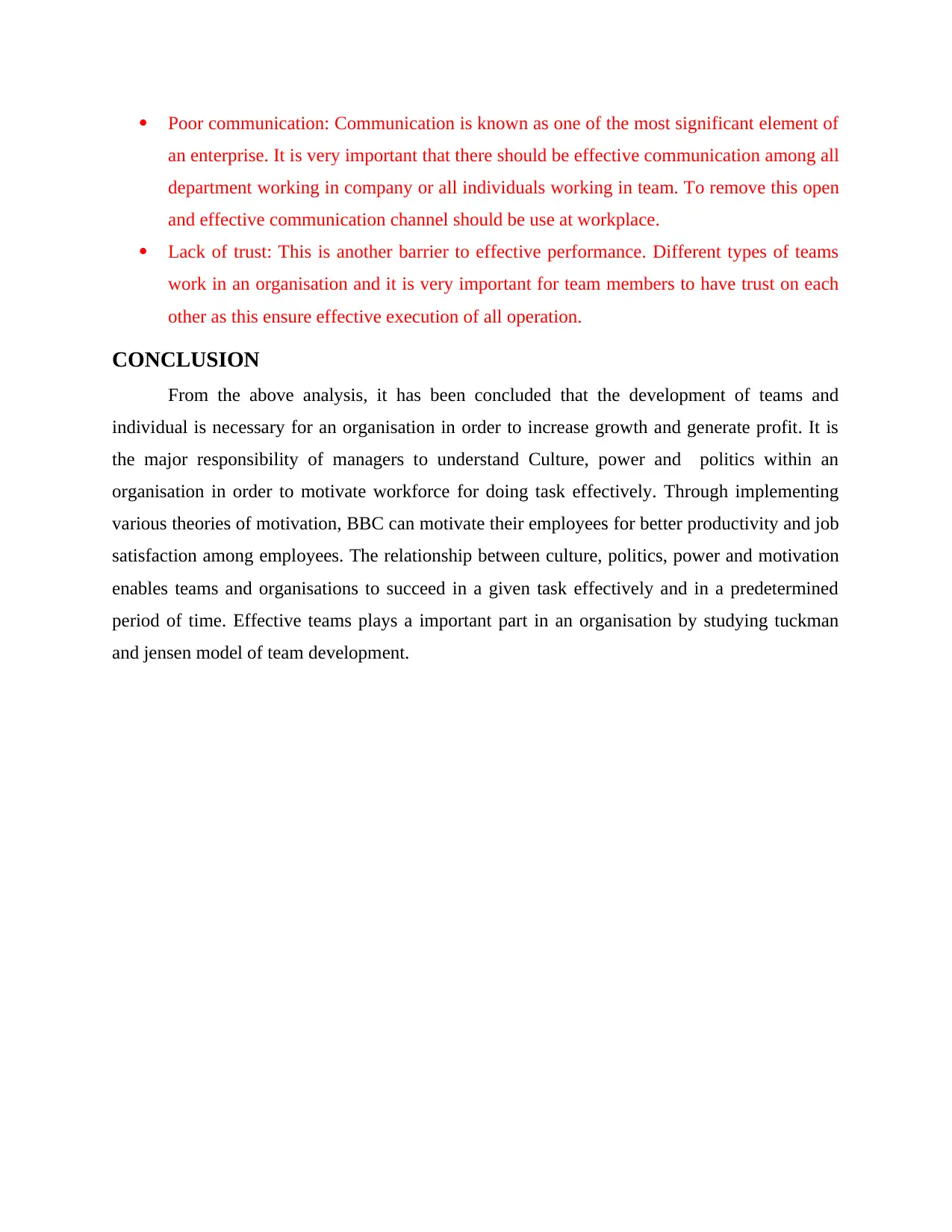
Poor communication: Communication is known as one of the most significant element of
an enterprise. It is very important that there should be effective communication among all
department working in company or all individuals working in team. To remove this open
and effective communication channel should be use at workplace.
Lack of trust: This is another barrier to effective performance. Different types of teams
work in an organisation and it is very important for team members to have trust on each
other as this ensure effective execution of all operation.
CONCLUSION
From the above analysis, it has been concluded that the development of teams and
individual is necessary for an organisation in order to increase growth and generate profit. It is
the major responsibility of managers to understand Culture, power and politics within an
organisation in order to motivate workforce for doing task effectively. Through implementing
various theories of motivation, BBC can motivate their employees for better productivity and job
satisfaction among employees. The relationship between culture, politics, power and motivation
enables teams and organisations to succeed in a given task effectively and in a predetermined
period of time. Effective teams plays a important part in an organisation by studying tuckman
and jensen model of team development.
an enterprise. It is very important that there should be effective communication among all
department working in company or all individuals working in team. To remove this open
and effective communication channel should be use at workplace.
Lack of trust: This is another barrier to effective performance. Different types of teams
work in an organisation and it is very important for team members to have trust on each
other as this ensure effective execution of all operation.
CONCLUSION
From the above analysis, it has been concluded that the development of teams and
individual is necessary for an organisation in order to increase growth and generate profit. It is
the major responsibility of managers to understand Culture, power and politics within an
organisation in order to motivate workforce for doing task effectively. Through implementing
various theories of motivation, BBC can motivate their employees for better productivity and job
satisfaction among employees. The relationship between culture, politics, power and motivation
enables teams and organisations to succeed in a given task effectively and in a predetermined
period of time. Effective teams plays a important part in an organisation by studying tuckman
and jensen model of team development.
⊘ This is a preview!⊘
Do you want full access?
Subscribe today to unlock all pages.

Trusted by 1+ million students worldwide
1 out of 13
Related Documents
Your All-in-One AI-Powered Toolkit for Academic Success.
+13062052269
info@desklib.com
Available 24*7 on WhatsApp / Email
![[object Object]](/_next/static/media/star-bottom.7253800d.svg)
Unlock your academic potential
Copyright © 2020–2026 A2Z Services. All Rights Reserved. Developed and managed by ZUCOL.





